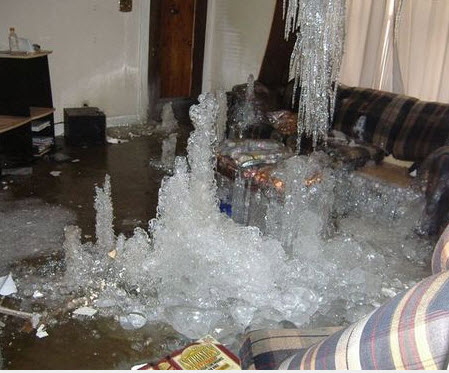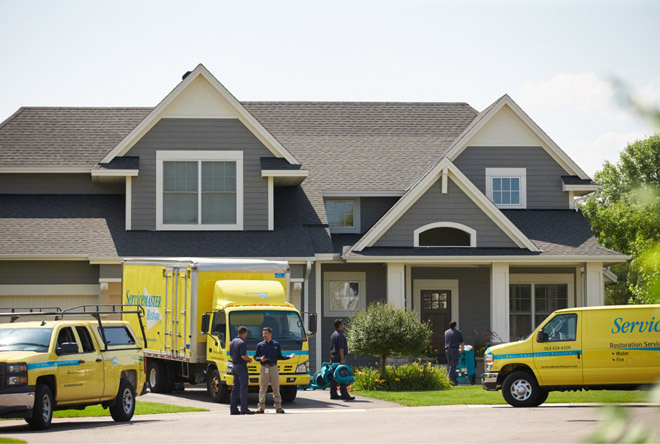How to Prevent Frozen Pipe Water Damages
Preventing Water Damages to your home such as broken, burst frozen pipes.
Prevent and Mitigate Frozen Pipe Water Damages in Your Home This Winter
Dealing with a Frozen Pipe as Temperatures Plunge in Boulder, CO
During wintery conditions in Boulder Co., dealing with a frozen pipe is not uncommon, yet the after effects can be costly. As temperatures plunge, water in a pipe can freeze and therefore expand.
This expansion increases water pressure downstream, which can potentially burst the pipe and cause a flood. Consequently, the resulting water damage to your home or business can be significant.
Learn what you can do to protect your property from a freezing pipe before, during or after the damage occurs.
Preventing a Frozen Pipe During the Winter
Even though the winter in Boulder, CO is now in full swing, there still are some things that you can do to help prevent a pipe from freezing. Water pipes most susceptible include those that are located close to cold exterior walls, as well as pipes in unheated areas such as the basement, crawlspace and attic. As a preventive measure, consider adequately insulating these vulnerable water lines with heat tape, fiberglass or other pipe insulation.
Additionally, when the weather is extremely cold outside take the following precautions
- Turn on faucets that are located near outside walls to allow both hot and cold water to trickle slowly.
- Open cabinet doors under kitchen and bathroom sinks to let warm air circulate around the pipes.
- Prevent drafts by closing all windows and air vents; seal gaps around exposed pipes. Water pipes are more prone to freezing when exposed to drafts during periods of low temperatures.
- Set the thermostat no lower than 55 degrees F during the day and night even if you plan to be away for the day.
- If your garage is attached to the house and has a water supply line, keep the door closed during the winter.
Monitor the situation during prolonged freezing conditions in Boulder. One of the first warning signs to indicate a frozen pipe is reduced water flow from a faucet or worse, a complete stoppage.
Thawing a Frozen Pipe
If you suspect a pipe is freezing, turn off the water valve and open the faucets. You can then thaw a frozen pipe using a few methods, but do it with caution and patience. Never use a blow torch or other open flame. Instead, use a hair dryer starting from the faucet and working back to the frozen section in the pipe. Another option is to wrap and rub the pipe with warm, damp rags until the frozen water melts.
Dealing with a Pipe That Bursts
Again, turn off the water valve if you haven’t done so already. Use your judgment to decide whether you can fix the broken pipe yourself or if you will need the help of a professional plumber.
A frozen pipe that bursts can subsequently result in flooding. To prevent water damage to your structures and personal belongings, it’s important to act quickly.
ServiceMaster of Boulder has the training, experience and equipment to help restore your property to pre-flood condition. Our Emergency Services include moving and protecting your personal belongings, extracting excess water, rapidly drying the affected areas and reducing the risk of mold growth.
Tips to Help Prevent Burst Pipes and Water Damage to Your Home This Winter
A common cause of winter water damage to your home occurs when pipes freeze and hairline cracks develop. When the temperature then warms up the water begins to flow again through these pipes and will exit these hairline cracks and flood the surrounding areas. Sometimes these pipes are hidden behind walls and the leak is not discovered until there has been significant damage done to your home.
Insulate Pipes in Unheated Areas of the Home to Prevent Water Damage
Exposed pipes in crawlspaces, basements, attics or any other unheated area of your home should be insulated to help prevent freeze breaks and flooding. Foam pipe insulation is fairly inexpensive and can be bought at your local Home Depot, Lowes and many other hardware stores.
Winterize All Outdoor Systems
Close inside valves that supply outdoor hoses and open the outside valves to allow any remaining water to drain from the system. Swimming pools and irrigation systems should be properly winterized as well. If you are unsure of how to do this there should be plenty of local providers in your area who can handle this service for you.
Leave Cabinet Doors Under Sinks That Are on Outside Walls Open
This will allow heat to more easily circulate in the cabinet and help to prevent any freezing of the pipes here.
Consider a Whole House Leak Detection System
Devices such as this will detect abnormalities in the water flow through the pipes and automatically shut off the water supply thus preventing what could end up a devastating loss. While we do not endorse any particular system, an example of what these are can be includes a Leak Defense System.
Turn Off Main Water Supply if You will be Gone For an Extended Period Of Time
With the Holidays coming people are often away from their home for an extended period of time. If a pipe leak occurs and is not discovered for even a day, the resulting damage can be devastating and reach into the tens and sometimes hundreds of thousands of dollars.
One common step taken to help prevent this is to turn off the main water supply and open a faucet on the lower level of the home to help all water drain from the system. A burst pipe while away for a few days can not only cause water damage but will also leave enough time for mold growth to begin to occur in many cases. At this point you are not only dealing with a water damage restoration, but also mold mitigation which can be equally and often more costly.
To learn more about preventing and mitigating damage caused by a frozen pipe, call us today at ServiceMaster of Boulder 303-5297268


